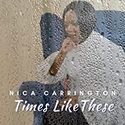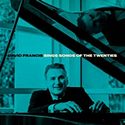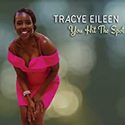|
 NICA CARRINGTON NICA CARRINGTON
TIMES LIKE THESE
Digital
What prevents a ballad-heavy album full of songs on the sad and lonely side, with romance relegated to the past tense, from being a non-stop pity party? In the right musical hands, as is the case with singer Nica Carrington's Times Like These, these reflections can feel beautifully bittersweet as one recalls the days before tears replaced smiles. Consider the wistful way these lyrics are rendered:
"People used to love to hear her laugh, see her smile" (from "When Sunny Gets Blue")
"I will be remembering 'The Shadow of Your Smile'"
"Your kiss, your smile are memories I'll treasure forever" (from "We'll Be Together Again")
"'The Summer Knows,' the summer's wise/ She sees the doubt within your eyes..."
Of course, it helps enormously that the singer has a gentle manner and a lovely timbre and that pianist/arranger John Proulx ups the emotional ante with exquisitely sensitive work. These two seem to be breathing together, experiencing the same recollections of experiences, side by side, sigh by sigh. And to complete the elegant picture, add the subtle shadings provided by two veteran musicians, bassist Chuck Berghofer and drummer Joe LaBarbera, each of whom has decades of experience playing with stars like Tony Bennett, Rosemary Clooney, Bill Evans, Michael Bublé, Barbra Streisand.
Histrionics are absent in these performances that are mostly in similar hues of blue and in slow tempi, but hope is not permanently missing in action. In two cases, that's thanks to a lark: the classic "Skylark" lyric wonders if the bird might lead the way to love, an idyllic "blossom-covered lane" and "wonderful music"; in Cole Porter's otherwise pained "Ev'ry Time We Say Goodbye" there is each reunion of the lovers when "there's such an air of spring about it/ I can hear a lark somewhere begin to sing about it." Similarly "We'll Be Together Again" soothes with its titular promise that patience will be rewarded eventually. The tender ten-track collection of mainly mature perspectives concludes with that carpe diem proposal of a toast with the metaphorical glass of optimism half full, "Here's to Life." Nica Carrington's interpretation doesn't come across as quite the resolute and inspiring life coach persona as others who've taken on this musical mantra. After all the traipsing through troubles that precede it, here it might seem too glib and pat without a patina of world weariness lingering.
Would that every vocalist motivated to make her debut recording succeed with such assurance, aplomb and grace–and be lucky enough to study with and be accompanied by a pro like Proulx. Nica Carrington rises to the occasion, and time listening to Times Like These is time well spent.
 DAVID FRANCIS DAVID FRANCIS
DAVID FRANCIS SINGS SONGS OF THE TWENTIES
Blujazz Productions
Digital (11 tracks)
 DAVID FRANCIS SINGS MORE SONGS OF THE TWENTIES DAVID FRANCIS SINGS MORE SONGS OF THE TWENTIES
Blujazz Productions
Digital EP (4 songs)
Don't expect a bunch of songs calling attention to topics specific to the decade when David Francis Sings Songs of the Twenties or ...More Songs of the Twenties. It's not about choosing lyrics from 1920-1929 that reference flappers with bobbed hair, Prohibition, or name-drop celebrities of the time with snazzy rhythms matching the period's dance crazes. The instantly likable and skillful Seattle-based baritone eschews the "cute" route of dusting off dated ditties and doesn't take on the pre-microphone age presentational style of entertainers. The repertoire is material that is notable for remaining timeless rather than transient. This isn't the gleefully brash roaring '20s; it's more smoothly swinging standards from the 1920s for the 2020s and forever.
A cluster of seven tracks got a release a couple of years ago (not previously reviewed here) as David Francis Sings Songs of the Twenties and now they have been reissued (same title) as a set with four additional tracks. Those four are also available separately as David Francis Sings More Songs of the Twenties; they are the joyful "'Deed I Do," the comical "Hard Hearted Hannah," "Love Me or Leave Me," and "'S Wonderful." All are delivered with spirit and panache, although I'd find "'S Wonderful" more wonderful if the singer were consistent in sticking with the song's unique gimmick (indicated by the title) of emphasizing the informality of the intended use of the elision and sibilant "S" sound before each of the song's descriptive words. Instead, most of them are changed here to "It's" or "It is." Others have made this change, irking its lyricist Ira Gershwin enough to air his complaint in his own book, "Lyrics on Several Occasions." Ira might also have been bothered by the inserted word "baby" to address the loved one in this upbeat number with brother George's melody that has shown up in Broadway productions and movies again and again.
There are two more Gershwin appearances on the longer set: the brothers' "Oh! Lady Be Good"; and "Somebody Loves Me" by the composer with Ballard MacDonald and Buddy DeSylva. These numbers, both from 1924, are delivered with flair and seem fresh, as do the other selections. (The only tiny tweak to avoid a word that's past its shelf life is in the line about finding a place to "cuddle and coo" in "Just You, Just Me"; he swaps "coo" for "woo," which preserves the rhyme, albeit sacrificing alliteration.) The performance of Hoagy Carmichael's lament acquiescing to late stages of aging, "Rockin' Chair," provides a promising clue of what talented Mr. Francis can do with a serious piece, without drowning in sentimentality or self-pity. He becomes his own scene partner, overdubbing his speaking voice effectively, echoing some sung lines.
Noting the apparent ease with different tempi, as well as with the musicians and arrangements, it's not a surprise to learn that the musically astute vocalist previously worked as an instrumentalist (guitar and bass). The trio here is especially effective and contributes mightily, including some very tasty introductions. Drummer Christian Milo Petersen is featured to good advantage on "Oh! Lady Be Good," bassist Paul Gabrielson's bowing is sublime, and pianist Karin Kajta shines and soars throughout, ever interesting and characterful in her dances across the keyboard. Even the tracks that are just a bit more or less than two minutes long are fully satisfying because self-indulgent embellishments or musical meandering are not on the economical agenda.
I'm hoping for much more to come from this suave man of song, whatever decade David Francis decides to dip into going forward.
 TRACYE EILEEN TRACYE EILEEN
YOU HIT THE SPOT
Honey Crystal Records
CD, Digital
With a combination of three studio tracks with six musicians and a trio accompanying her for five live performances, Chicago-based Tracye Eileen marks her tenth year of recording with You Hit the Spot. Her recent releases have been dedicated to material in the soul/R&B and contemporary smooth jazz genres, with some songs she co-wrote. However, she'd begun with traditional jazz and this new set is all old standards from the Great American Songbook, dating from the 1930s (half of the eight tracks) to 1961's "I Love Being Here with You." The latter's lyric, a panoply of pleasures, is quite giddy in this version of the number introduced and co-written by Peggy Lee and the man writing under the pseudonym of "Bill Schluger" who was actually Dave Cavanaugh, a top executive at her record label, Capitol.
Tracye Eileen comes across here as more of a stylist than pure singer or improvising jazz artist. A lot of You Hit the Spot is undemanding, breezy listening and some voluminously recorded items are re-shaped in different–albeit not distinctive or definitive–form. There's a tendency to rely on sass over substance. For longish sections of a few selections, like much of a lush and languid "The Very Thought of You" and the beginning of "The End of a Love Affair," she seems to be authentically inhabiting lyrics, and then reverts to playing the "playful" card. That pulls me out of the song and the established drama. Embellishments such as pouncing on a word or phrase with winking flirtatiousness or would-be fierceness is less distracting or distancing when the treatments are on the light-hearted side. Thus, three show tunes charged up with cheer–"Almost Like Being in Love" from Brigadoon; "This Can't Be Love" from The Boys from Syracuse; and "Just in Time" from Bells Are Ringing–are pleasantly peppy and stay in their high-speed lane. And it's a nice touch to include the introductory verse to "Just in Time" ("I was resting comfortably, face down in the gutter...").
Perhaps many of the tics and tricks and embellishments to highlight words are motivated by the presence of the live audience–an eagerness to entertain!, have moments of connection and to elicit reactions. You Hit the Spot's spotlight hits the performer more than it illuminates the somewhat upstaged lyrics and music (and musicians). It can be a tricky balance. But, in balance, Tracye Eileen has the plus factors of energy, a bright voice, and confidence. And a ray of sunshine can be a good thing.
|